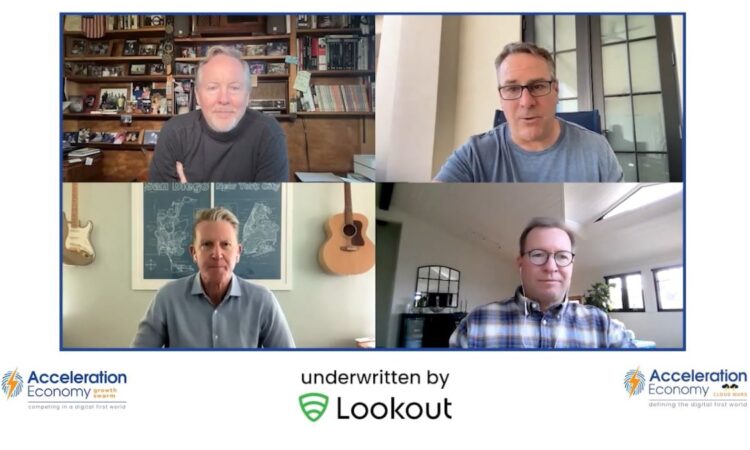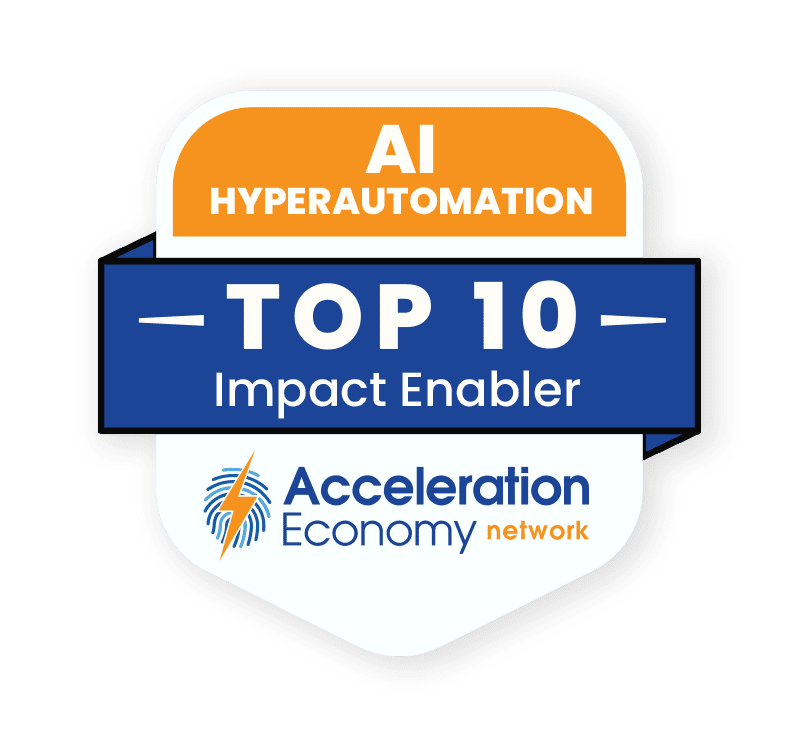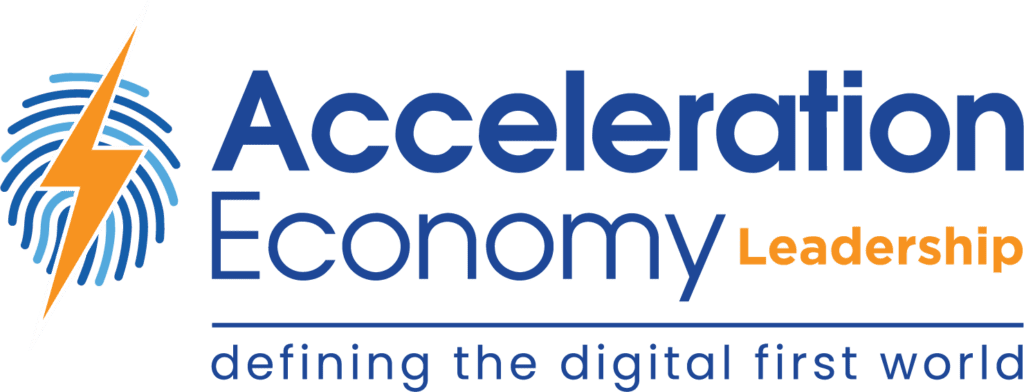
In episode 38 of the Growth Swarm podcast, John Siefert, Bob Evans, Tony Uphoff, and Scott Vaughan discuss the effect that ChatGPT and generative AI could have on today’s current advertising-driven, clicks-based “attention economy,” helping evolve it into an “acceleration economy” that’s more focused on innovation than on monetizing people’s time and attention.
[This episode of Growth Swarm is brought to you by Lookout, which is an Acceleration Economy Top 10 Cybersecurity company. Read more about Lookout here.]
Highlights
01:13 — John introduces today’s topic, which expands on an idea from Tony’s recent Leadership Minute, in which he talked about the role of ChatGPT and generative AI and its potential to shift the current “attention economy” into an “acceleration economy.”
01:51 — Tony briefly recaps the concept from the recent minute, saying that the “original sin of the internet was that it became an advertising-based medium,” and, over the years, it has resulted in the three most valuable companies on the internet being advertising-based businesses. As such, they focus completely on capturing and retaining attention to get people to check their social media feeds constantly and click on ads.
02:32 — Tony isn’t against advertising, but says that focusing on it as the sole business model has resulted in some unintended consequences: Namely, that we have a generation, if not multiple generations, of talent — remarkable world-class, once-in-a-generation talent — that is fundamentally deploying its abilities to get people addicted to checking their social media feeds and clicking on ads.
03:25 — However, ChatGPT might be opening up an opportunity to steer us back to what the internet really should be, which is not a platform for the attention-based economy, but rather a platform for the acceleration economy. The internet should not only be about enriching and growing your life, but also businesses. It should be more entrepreneurial, serving as a better growth driver for a variety of businesses, not just the “Big Three” that seem to control and, in many cases, choke out the internet today.
04:17 — John says Tony’s thinking on this makes him think about Acceleration Economy AI /Hyperautomation channel analyst-practitioner Toni Witt, who is a native digital and as such, represents the youngest generation of talent that grew up in the current attention economy. He just founded a company called Cosmo Labs; how does this factor into Tony’s ideas around an attention economy evolving into an acceleration economy?
05:49 — “I think every generation wrestles with this,” says Bob, in reference to native digitals and older generations not understanding what makes the younger generations tick. He teases out Tony’s larger point, which is that we don’t always fully understand what we have as it’s happening. He may think that native digitals are just goofing around on their devices, but there is likely a lot more going on there that is pretty powerful, and he hopes that as a result, we will get to see more entrepreneurship, new ways of learning, and new ways of engaging.
07:08 — It’s going to be hard to foresee what’s coming. For example, what’s the role of something like ChatGPT in education? In a recent piece, Toni Witt wrote that he thinks colleges are, for most people, a waste, and that we don’t need that anymore. And just this week, someone from Accenture said that 45% of the positions in the company no longer require college degrees. The pace of technological innovation is driving change forward rapidly, and some of the norms that we have imposed up until now, like going to college, may well go by the wayside. Ultimately, Bob is trying not to have knee-jerk reactions by applying yesterday’s mindset to today’s reality.
09:42 — Scott loves this topic and says he was moved when listening to Tony’s point of view on how people are being impacted and this shift. In addition to us not realizing the intensity of the attention economy’s effects on entire generations of people, there was a pandemic that only added to the device and social media addiction, resulting in further isolation. “But that’s not where we’re going to get stuck,” says Scott, who is equally excited by the ways today’s businesses like Oracle have flipped to focus on how to advance healthcare.
10:41 — Previously, we didn’t have the capacity, the data or data science capabilities, hyperautomation, and multi-cloud strategies, but today that technology is increasingly going into the hands of more people, and that data democratization is enabling these “data citizens” to do great things. The more that we move into this kind of scenario, and the more we get younger generations into these types of roles, Scott says, the more we will start to see this sea change. The promise of AI, with safeguards, to realize this potential is something he is particularly excited about.

12:52 — Picking up on Scott’s mention of guardrails, John notes that Microsoft recently laid off its entire AI ethics team, even as it goes all in on generative AI, not only embedding it into Bing, but throughout its products, including Dynamics 365. This raises some eyebrows for John, especially in light of Tony’s comments about the early days of the advertising model and the resulting attention economy and its effects.
15:11 — While Tony is “not a fan of regulatory stuff,” and is “not making that call here,” he does think that consideration around the ethical use of AI is important.
16:45 — ChatGPT will be remembered as the mainstreaming of artificial intelligence. And while we can’t sacrifice the power of these remarkable technologies to too many rules, Tony says, we still need some ethical guidelines. Are there lessons we can learn from the attention economy? This is probably a little bit of a wake-up call.
17:45 — “I just love this conversation,” says Scott. “My head is spinning.” He thinks that business leaders must see this as an opportunity to “take the joystick, really step back, and drive this conversation among your colleagues and your team.” In other words, “play chess and map the future a bit.” This will not only drive you towards a better strategy and build a framework path. If you use AI tools to help you do that in your planning, that’s cool, too, but this is a moment in time. “Let’s bring it in and see what it means for you, your organization, and an opportunity to do some pretty good things,” Scott says.
18:15 — Bob points out the immense computing power and expense of generative AI at the moment, and says that this is something to take into consideration as plans, strategies, and frameworks for the future evolve. “We want to play some grown-up games here with some toys to see just ‘why did we choose to do this,’ “ he says, “but that’s a good thing. Ultimately, the price will come down. This is a new type of technology that’s so far out there in its capability, but also in what it is…it’s going to require a fresh type of thinking.”
21:06 — John wonders if Einstein would still want to do thought experiments if he had had ChatGPT. While John doesn’t want this to sound like a cautionary tale, he does think that “we don’t lose the ability to critically think and just depend on generative AI or whatever form of AI that becomes to do the critical thinking for us, because then what happens is we lose that ability, and the edge on that knife becomes very dull.” He agrees with Bob on the need for fresh thinking on this exciting new technology.
Want more tech insights for the top execs? Subscribe to the Leadership channel:







